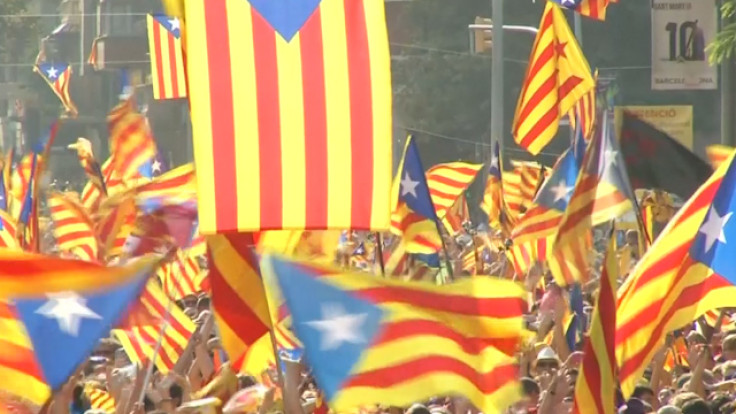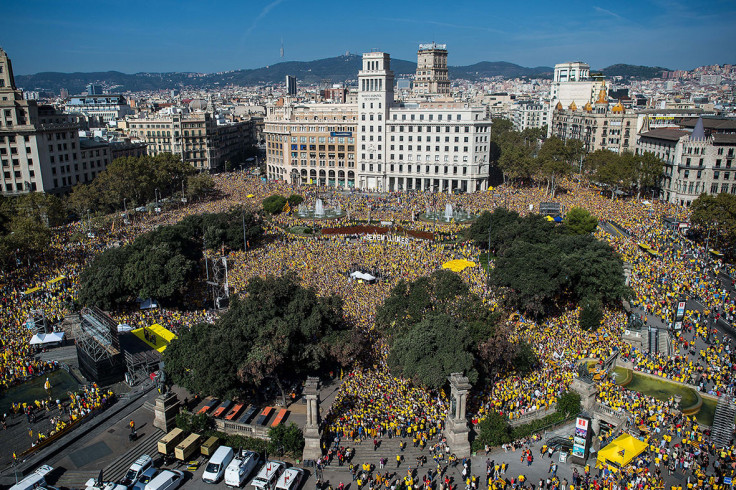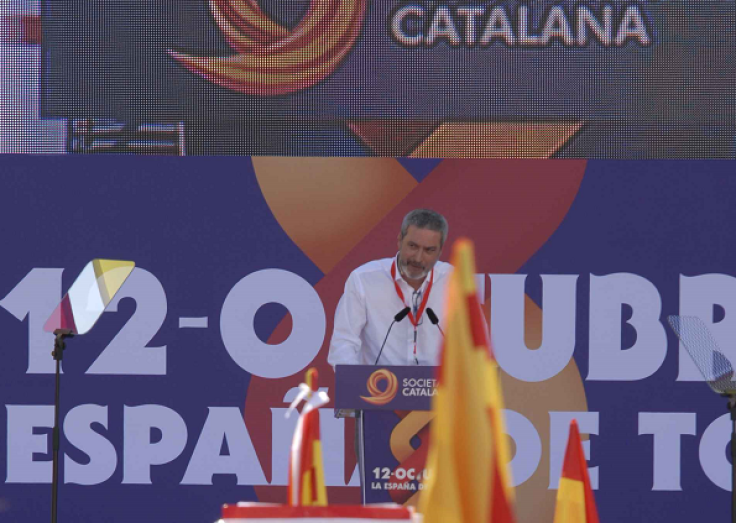Catalan Independence Referendum: 'Nothing will Happen on 9 November' says Pro-Union Champion Josep Ramon Bosch

Catalonia has announced that it is still going to hold an independence vote despite Spain's Constitutional Court suspending the referendum, and then outlawing the "citizen consultation" which was established in its place. With less than a few days until Catalans go to the polls on 9 November, the key issues seem murkier than ever.
In September we spoke with Carme Forcadell, president of the Catalan National Assembly [ANC], the organisation behind the mass pro-independence rallies that took millions of people to the streets asking for the right to vote for independence in September.
But what about the Catalan pro-union members? Where and who are they? What do they think about the current situation?
Josep Ramon Bosch is the president and co-founder of Societat Civil Catalana, a pro-union association, created six months ago with people from "different political and social sensibilities" claiming their right to be both Catalan and Spanish.
We spoke with him a couple of weeks ago, just after Societat Civil Catalana organised a rally that gathered almost 40,000 people in Barcelona.
So what do you think will happen on 9 November?
Nothing. After 9 November, 10 November will come and nothing will happen. The problem will be in May with the municipal elections.
When ERC (the left-wing independence party and the Catalan president's main ally) win the municipal elections, the councils will want to proclaim the unilateral declaration of independence.
Next year, 2015, will be a very difficult and complicated year in Spain. Because it's a Spanish problem, not Catalan.
Are you for or against voting?
I am always in favour of being able to vote and allow all kinds of consultations, but only if they are legal and have the permission of the state.
In any case, I think the Catalan consultation is unnecessary because Catalonia is a free nation, is a democracy and its population votes freely periodically.
Societat Civil Catalana's manifesto states that the process is not justified. Why?
First, as a matter of history, Catalonia has never been an independent nation. The County of Barcelona belonged to the Crown of Aragon, but in the 15<sup>th century the Crown of Aragon decided freely to unite with the Crown of Castile to form Spain.
From an economic point of view Catalonia is a poor country, we do not have economic resources, and that the Catalans have historically had the Spanish market subjugated, it means that historically we have closed the Spanish market to the exterior to sell them our products.
Also there are cultural reasons, the parents and grandparents of 60% of the Catalan population were born outside Catalonia and their language has always been Spanish.
But there have been millions of people who have taken to the streets asking to vote...
First there weren't millions, we counted one by one. In last year's rally we counted 795,000 people, and in this year's famous "V", there weren't even 800,000.
We have it all explained in our website. It's true that many people have lost their confidence and feelings against Spain. We believe they should explain [to their fellow Catalans], from a rational perspective, that an independent Catalonia is not viable and that belonging to Spain is a good deal.
How did the Scottish referendum affect Catalonia's process?
The fact that Cameron's government decided to undertake a referendum triggered Catalans' aspirations. We believe the Scottish referendum was an unnecessary risk that could have posed a serious problem in Europe.
If regions like Catalonia, the Flemish Region, Lombardy, Veneto, some German state or Corsica decide to secede, Europe would be cut into pieces, and that would go against its philosophy.
We don't need a nineteenth-century romantic nationalism. We all know how many deaths these nationalists brought in the twentieth century.

Scotland voted 'No' to independence but during the campaign, the 'Yes' movement seemed much more prominent and noisy, even though only one survey suggested they would win. Do you think something similar would happen in Catalonia?
Exactly the same. There is a very important silent majority. Don't forget that Catalonia is guided by the propaganda of its government - it has invested hundreds of millions in adverts on the public television, a public TV that is serving the independence with institutional advertising.
The Catalan government has also started numerous institutions whose only purpose is to promote the independence. But in all the surveys we have done in recent years, the vast majority of Catalans have always felt both Spanish and Catalan.
So do you think the "No" would win?
It depends. Promoting the 'no' is very difficult. But if we had the same communication capacity [as the 'yes' campaign] I think it would be a massive 'no' for independence.
Should Spain negotiate an increase of Catalonia's fiscal autonomy as the UK government said it would with Scotland?
Catalonia is guided by the propaganda of its government - it has invested hundreds of millions in adverts on public television
Well, remember that Spain is a federal state, although not nominally. Catalonia has more competences than any autonomous region in Europe: police, TV, legislative, economic, etc.
Catalonia is more autonomous than almost any federal German state and almost any US state.
A different thing is that Catalonia needs a fairer tax regime, and a law protecting the Catalan language. There are issues that need improvement. But breaking a country like Spain for things like these is unnecessary.

You met with Rajoy in July. How was the meeting?
I've never been a big fan of Rajoy but I met with him for two hours. He was very interested, very convinced, very aware and well informed of the Catalan situation.
Beyond what happens after the 9N, we agreed that the Catalan crisis can be a great opportunity to reinforce a Spain for the 21st century – stronger - and that this crisis can mark an end to the Spanish transition era.
Do you think that the Spanish government has boosted Catalan independence with its behaviour?
Yes, what the Spanish government has done is a very bad campaign. If a region is asking for an independence referendum you can't just talk about law, constitution and threats. It should be a sentimental speech, explaining the benefits of Catalonia being a part of Spain.
From Societat Civil Catalana we want to work this battle of emotions and feelings, even propaganda, and show that Spain is not a country of thieves and crooks and corrupts, but a country that has had many problems.
We had a Civil War but we are really nice people, friendly locals. The people from the Basque Country, Andalusia, Canary Islands, Navarra, Asturias or Galicia are all different, but this diversity is the greatness of Spain. And these different cultural nationalities decided to share many things together for many years. Beyond romantic and historical differences and lies.
Do you think that it is too late to understand all this?
It's never late, we always have time to rebuild bridges, but it is true that we should have started working much earlier and not just putting everything in the hands of a Constitutional Court.
© Copyright IBTimes 2024. All rights reserved.






